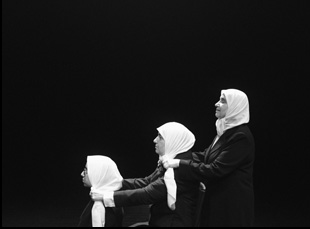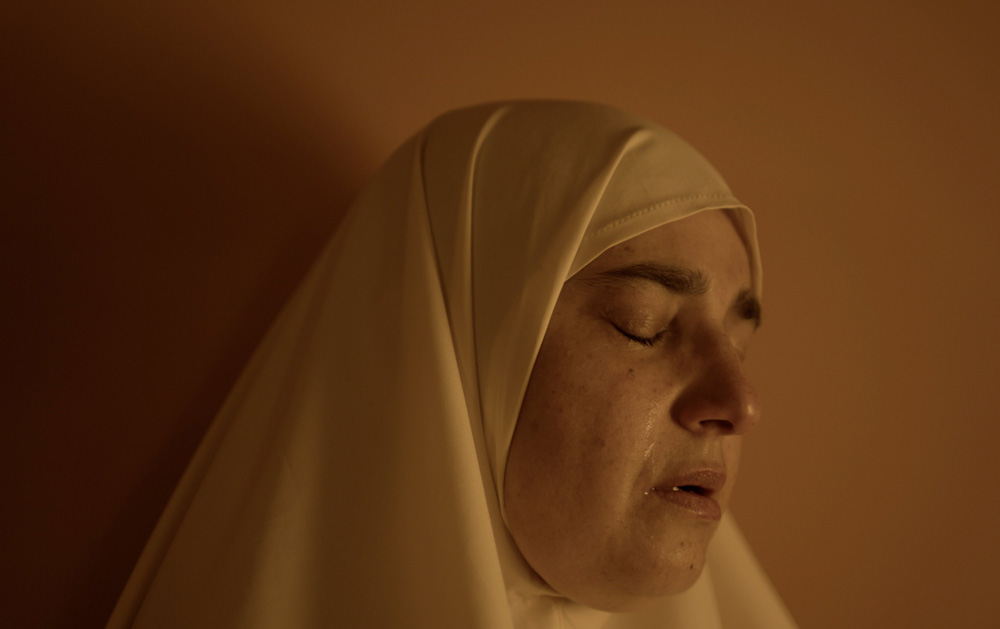“Love is very, very dangerous,” Hiba tells her daughter Jude Chehab at one point in “Q,” a scene in which she surely wouldn’t be pouring her heart out for anyone else, yet doing so looks to put her at considerable risk after she’s been excommunicated from a secretive religious sect known as the Al-Qubaysiyat Sisterhood in Lebanon. It’s relatively easy to see the allure when she still practices many of its main tenets, reading the Quran and sharing her poetry in a tranquil space amongst other women, but also how confounding it can be when she loses her connection to the leader of the group known as the Anisa, whose title Hiba previously might not said out of reverence but now can’t seem to utter in pain.
Chehab, who was raised in the religion herself, can sympathize with how hard it is to break away from, returning to Lebanon after time abroad studying to become a filmmaker and applies both that instinctive compassion and learned skill to portray the brokenness her mother is experiencing after such a large chapter of her life appears to have been closed while recognizing the hold it’ll likely have on her forever. It isn’t only a complex emotional situation for Hiba to work out for herself, but also for her loved ones, who may have felt before as she does now in being sidelined as neither her mother Dania or Ziad, her husband of 30 years, can know how to comfort her when she’s kept such a large part of her life private from them all that time and her children have given more attention to the interests they’ve developed on their own in her veritable absence.
There’s a feeling in “Q” that Hiba is experiencing her past for the first time, blinded to it by the devotion to her religion the first time around, and having left enough clues into her own mind from the poetry she wrote and her participation in theater, there’s something appropriate about Chehab finding such an artful way to bring these memories together into something tangible to contend with the deep sense of loss she feels. Telling her disciples “Memories are better if they’re there in your mind” when urging them not to take photographs during a reading as she was once admonished for as part of the group, Hiba becomes a beneficiary of documentation, confronted with the person she had been when she’s left with no choice but to start anew and there may be other ways to express her faith outside of the structures she’s known. With the film premiering this week at Tribeca, Chehab graciously spoke about how she broke away from certain narrative structures to make “Q,” the confidence a camera can afford when probing such sensitive issues within a family, and how the film has become a shared expression of both her mother and herself.

It definitely is a difficult film to make, and because I’m so in it — I was with the group my entire life — I couldn’t even tell that something different was going on. I just thought this was Islam, this was religion. I didn’t realize my family was part of something very specific, so I think it wasn’t until I moved to the U.S. and had that distance with my family and the group where I could actually look at it from an outsider’s perspective. My curiosity began and I wanted answers from my mom about the group and about this attachment, but it was definitely difficult and it stayed difficult for the first couple of years, even just for my mother to have that openness in the film.
Does the camera allow you to ask questions you might not be able to otherwise?
Yeah, we were filming on a Canon C300 Mark II [which is] a pretty big camera. It’s really present and you really feel it, but it becomes this boundary, like a protective layer between you and the person that you’re talking to. Like the scene with my dad when I’m really interrogating him, that wouldn’t have happened if the camera wasn’t there and I think at a certain moment, he forgets it’s there and he is very open, but would I feel comfortable bringing up those questions if it wasn’t for the camera? Probably not. And they’re definitely used to the camera [already]. My grandma loved having the camera around. She went full diva mode of “How do I look?” So I don’t think the camera felt very foreign to them.
Did you know the size of your own role in the film from the start?
I was very hesitant about being in the film, and I did get a lot of pushback. We had mentors from our institutional support [saying], “We need more Jude in the film,” but it always felt to me that the film was about my mother, and about her going through this. This is the essential story. But [my presence] is very subtle. I come in in the beginning, I say something at the end, and there’s something in the middle, but the purpose of me being in there is to push them in that way to try to reveal these truths within them and to save my mother. It’s really about how can I have her lift the veil from her eyes and to see the pain she’s going through and that’s now being inflicted on the family because of the group.
When she might not have anyone else she could feel comfortable talking to about it, did having those conversations feel like it was therapeutic?
I hate that. I don’t think I should make a film for it to be therapy for my mother, but I definitely think that she isn’t talking to people about these things, so that’s what was really beautiful. I wouldn’t have had those conversations with her [ordinarily] and I do think it brought her somewhere. When you reveal these things, she understands hidden things about herself that she’s been covering up for so long. She told me recently that the film allowed her to become more real, so it’s just that transparency and you’re hearing yourself say things back, you’re trying not to be so performative. With the group, I think she was very performative, and we play on that a little bit in the film with her [time] in the theater because I feel like religion can feel performative to a certain extent. You go into that religious space, whether it’s the mosque or the church, and you really put on this act, so I think with the making of the film, she was able to strip all that away and just try to really be the real Hiba.

Yeah, initially I wanted to make something revealing about this very mysterious group. I wanted to understand them better, and through understanding them, I could understand my mother. But when I started to interview like ex-members of the group or people who are still with them, it just felt like very Al Jazeera, [where I thought] this is not my style. I wanted it to be very poetic and I always knew that the story really is mom’s story, her experience with [Q] and the consequences, so it shifted a lot. As we were filming, I think my expectation was that the end of the film is going to be Hiba’s free and she has this moment [where] she regrets all these years and she really comes to this awareness. But that doesn’t happen. I was naive going into it, thinking she’s going to think the way that I do and that’s not human nature. She’s been with these people for 40 years. She’s very loyal to them. As the daughter and as the filmmaker, I was just like, I don’t understand. Do you love them or do you hate them? In a very reductive sense, and I ended up learning that that’s not clearly how humans work.
There’s a really moving moment relatively early where you actually ask your mother whether this film is even something that she wants and she somewhat tentatively says, “I want what you want.” What was that like in the room?
It’s very difficult because I had to question myself throughout and I’m also questioning am I being an Anisa in her life? Am I controlling her in another way? Subconsciously, I think she always knew and felt the responsibility to make the film. I’ve heard it recently. She’s finally now saying, “You know what? It’s my life. This is my story, and I’m going to take ownership” in a way that before she wouldn’t have said because she was way too anxious about the group’s perception of her and their judgment. So it is this really honest moment between the two of us of like, “Why are you doing this?” And maybe until the end people won’t understand my intention, but I hope it’s clear.
Was it difficult to structure so that that consciousness comes together all at once? It seems particularly fearless to do something where there are missing pieces that only slowly start to coalesce as it must’ve for you personally.
Yeah, the edit was like hell. For me, it was harder than all the shoots and all those difficult times when there was something uncomfortable happening. It was really difficult because I wanted to do justice to her story and I didn’t want to put a bad image of Muslims out there [because] we don’t need more of that, so it was like being on a tightrope. At the same time, because Hiba doesn’t have this very strong moment of clarity, and I know how she deep down feels about the group and her time with them, [I was looking for] does it happen in this moment on screen? So it was a matter of getting all these subtle moments of her saying all these things that evoke, “Okay, Hiba now is on her own path.” She’s not with [Q], but she doesn’t say it. It’s not so obvious.
Her poetry seems pretty revealing on its own. What was that like to weave in?
The poetry was essential, [as well as] the love letters that she wrote to the group. It definitely allowed us to keep the tone and the language that we wanted for the film. The visuals are giving off this meditative feeling, and then also being very subtle. I’m sure some people are going watch it and just be like, I didn’t get it or “What is the ending? What is the group?” And it’s like, that’s not what’s of importance. But her also having those poetic moments, it’s clear the language that we are both conversing in.
What’s it like to get off your shoulders and get into Tribeca?
It definitely feels like a relief, also because it just ends on a really beautiful and uplifting note and that’s really what I wanted, so it feels great. I’m obviously nervous about the premiere and just seeing how people react to it and if it resonates with them or not, but the family’s coming from Lebanon and everyone’s very excited. I’m just hoping it’s this moment of celebration after a lot of struggle. It wasn’t easy, but this is what we’ve done and it’s something beautiful and I hope they can see it that way too.
“Q” will screen at Tribeca Festival at the AMC 19th on June 10th at 6 pm and June 14th at 5:45 pm and on June 18th at the Village East at 11:45 am.




